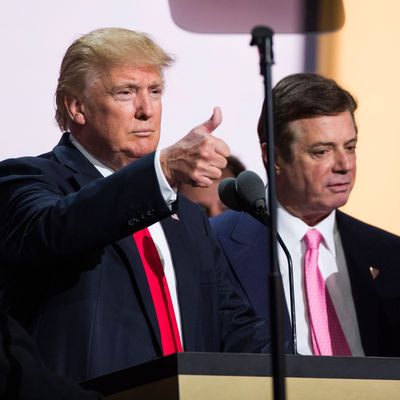
Before he took control of Donald Trump’s presidential campaign, Paul Manafort ran a political influence operation in Ukraine. Manafort’s goal in Ukraine was to elect a corrupt, pro-Russian party led by Viktor Yanukovych, and to prevent the country’s government from falling into the hands of pro-Western opposition. Perhaps the darkest read of the Russia scandal is that Trump was an American Yanukovych — a pro-Russian candidate, elected with Russian backing, at the direction of Manafort. That dark scenario is what the recent revelations about Manafort’s role all point to.
Two weeks ago, the Washington Post reported that Robert Mueller and congressional investigators had obtained emails recording correspondence between Manafort and representatives of Oleg Deripaska, a Russian oligarch. Being a billionaire in Russia is not like being a billionaire in the United States. It requires maintaining an intimate relationship with Vladimir Putin. Their foreign policy dealings do not involve freelancing. When he is dealing with Manafort, Deripaska is doing Putin’s bidding.
In one email obtained by the Post, Manafort asked, “How do we use to get whole?” Manafort’s spokesman tells the Post this means nothing, because “it’s no secret Mr. Manafort was owed money by past clients.” But the known contours of the relationship indicate just the opposite. It is not that Manafort was owed money. It appears Manafort owed the money.
The year before Manafort joined Trump’s campaign, Deripaska filed a complaint in a Cayman Islands court that Manafort had borrowed $19 million from him and failed to account for it, and even hired a private investigator to track down Manafort, who had essentially gone into hiding. Julia Ioffe and Franklin Foer have obtained the emails that the Post reported on earlier. And while the messages are written carefully and frequently encoded — they refer to “black caviar jars” to mean payments, for instance — they indicate that Manafort was trying to impress Deripaska with his work as Trump’s campaign manager.
Manafort’s role as unpaid campaign manager for Donald Trump gave him a position of potentially enormous value to Russia. His massive debts to a Kremlin-aligned oligarch made him enormously vulnerable to being used as an agent of Russian influence. This is probably why the FBI was wiretapping Manafort, as CNN has reported, and why espionage experts have described Manafort as having the profile of an “ideal spy.” The emails are crucial because they go beyond circumstantial evidence to show Manafort communicating with Russian paymasters.
More specifically, he can be seen displaying his relationship with Trump to the person he apparently owed a massive sum of money. If he was using his position to get whole, as he wrote, it would mean Manafort was delivering favors to Russia through the Trump campaign in order to pay off his debt.
Having a president’s campaign manager secretly working on behalf of a hostile power would constitute a scandal of almost unimaginable scale (unimaginable in the pre-Trump world, anyway). But this might not be the totality of the scandal. Many reports have suggested that Robert Mueller is not only trying to target Manafort, but is hoping to find sufficient evidence of criminality to induce Manafort to flip on Donald Trump. One short passage in a CNN report from last month is worth pinning in your memory: While Manafort left his position as campaign manager in August 2016, he continued to speak with Trump through the campaign and even after Trump took office. Their conversations continued “until lawyers for the President and Manafort insisted that they stop,” CNN learned.
Whatever problems Manafort faces with Mueller, Trump’s exposure to those problems may be fairly extensive.






























